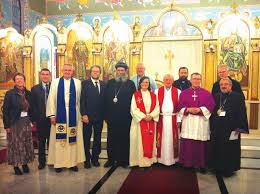The goal of ecumenism (objective organic unity of Christian denominations) has been
highly elusive for the church. During the last half of the twentieth century
many Christian denominations have made great effort to develop closer
relationships and understandings. Mergers were realized among groups such as
the Methodists, Presbyterians and Lutherans. Still, ecumenism remained an
un-ending series of high hurdles to cross over (as was the case with plenary
sessions of the Consultation on Church Union 1960). I believe ecumenism as we
envision it to be will continue to be elusive in America, especially since the
idea of America has been built upon pluralism and the freedom of religion. It
is Christ’s wish that we come together (Jn. 17:21), though the path is difficult
(not impossible).
Supporting the mission of "the Way" (Acts 9:2) and the Christian call to maturity (Eph. 4:12-13).
Prayerfully Support The Mission
Monday, December 17, 2018
Wednesday, November 21, 2018
Monday, November 12, 2018
American Church History: Dealing With Multi-cultures
One of the most unique challenges faced by Christians during
the colonial years was the internal struggles within the movement itself.
Interestingly enough, these struggles were very closely tied to pro/anti
American Revolution sentiments. In the North East or what we can call New
England territories, there continued to be struggles related to ties to the
Church of England. Why would anyone wish to identify with England and its
church with the push for liberation? Why sever ties with the people who
provided means for a new life? After all, wouldn’t that be the least these new
territories could do for the motherland? Not quite. Aside from economic
and political motivations related to the revolution, the North Eastern region
became a melting pot of diverse religions and worldviews, pre-dominantly
pro-freedom of religious liberties. In Lancaster county, Thomas Barton
described the presence of “German Lutherans, Calvinists, Mennonites, New Born,
Dunkers, Presbyterians, Seceders, New Lights, Covenanters, Mountain Men,
Brownists, Independents, Papists, Quakers, Jews.”[1] Imagine
a community in which such diverse religious worldviews are competing for space,
influence and converts.
Friday, October 26, 2018
Struggles Of Blacks & The Church In Early America
Consider if you will the history of the Christian church in
the early stages of the development of the New World, specifically the
settlement of Virginia. It was the 1700’s. England colonized this portion of
America, importing its religion of which the Church of England was preeminent. The legal structure for the official Church of
England was set up in 1660, with parishes being set up and one doctrinal
standard established as set by the bishops of England. If you were not properly
ordained and commissioned by the Church of England you could very well lose
your livelihood. Here’s how the Virginian officials put it: “If any other
person pretending himself a minister shall, contrary to this Act, presume to
teach or preach publicly or privately, the Governor & Council are hereby
desired and impowered (sic) to suspend & silence the person so offending.”[1]
Talk about keeping it together!
Saturday, October 20, 2018
Cultural Intelligence Applied To Mission
The Great Commission mandate
provides a clear directive to believers: “Go,
Make Disciples, Baptize them, and Teach them *Mat. 28:19-20). This seems
like a simple enough task until one recognizes the universal reach of the
command: “of all nations”. This gospel is to be preached to all nations (Mat.
24:14). This mission to the nations
calls for the application of cultural intelligence as communicators of God’s
message will need to have “a core understanding of cultures, language patterns
and non-verbal behaviors,”[1]
unless the preference is to limit their cultural exchanges to a certain
demographics. Many of the nations to which the gospel will be preached comprise
people “whose tastes, behaviors, and assumptions are not only different but
often in conflict with one another.”[2]
That said, the message of the gospel may be foreign to many within these
foreign nations. This means a clear grasp of intercultural communication that
is catered to the audience. We are talking about creating an indigenous
experience that is totally biblical, especially since the gospel is a universal
message with universal appeal. The same approach can be used for local missions
work.
Sunday, October 14, 2018
The Operation of Spiritual Gifts Within God's Church
The Equipping & Building Of
The Church (Ephesians 4:12-16)
Unfortunately, in many churches, only the office of the
pastor seemingly is in operation. Christ’s intent was that all of his saints
who have been graced with a measure of his gift would operate in their gifting
(or that which they have been graced with) “in order that everything in the
church might be well arranged, or put into its proper place, that Christians
may have every possible advantage for becoming complete in love, and knowledge
and order.”[1] The main idea here is that the church becomes
mature when Christ’s gifts are functioning within the community of believers.
Jesus proclaimed he would build his church (Matthew 16:18), and he saw fit to
govern such and organism through these various offices.
Friday, October 12, 2018
“What Did Jesus Say About Homosexuality?”
The debate surrounding
marriage is as old as Moses (Deut. 24). Homosexuality as well has had historic implications since Old Testament times
(Gen. 19; Lev. 18:22, 20:13). Michael Brown contributes to the debate with a
biblical response to the homosexual agenda in light of the institution of
marriage (Gen. 3:18-24; Mat. 19:8; Deut. 24) and the argument of silence that
supposedly supports tolerance of homosexual relationships in light of Matthew
19:11-12. If this were the times of the apostle Paul, he would say that any
claim that the Bible favors homosexuality is not only false doctrine, but the discipline
of homosexual theology is biblically incompatible.
Subscribe to:
Posts (Atom)





